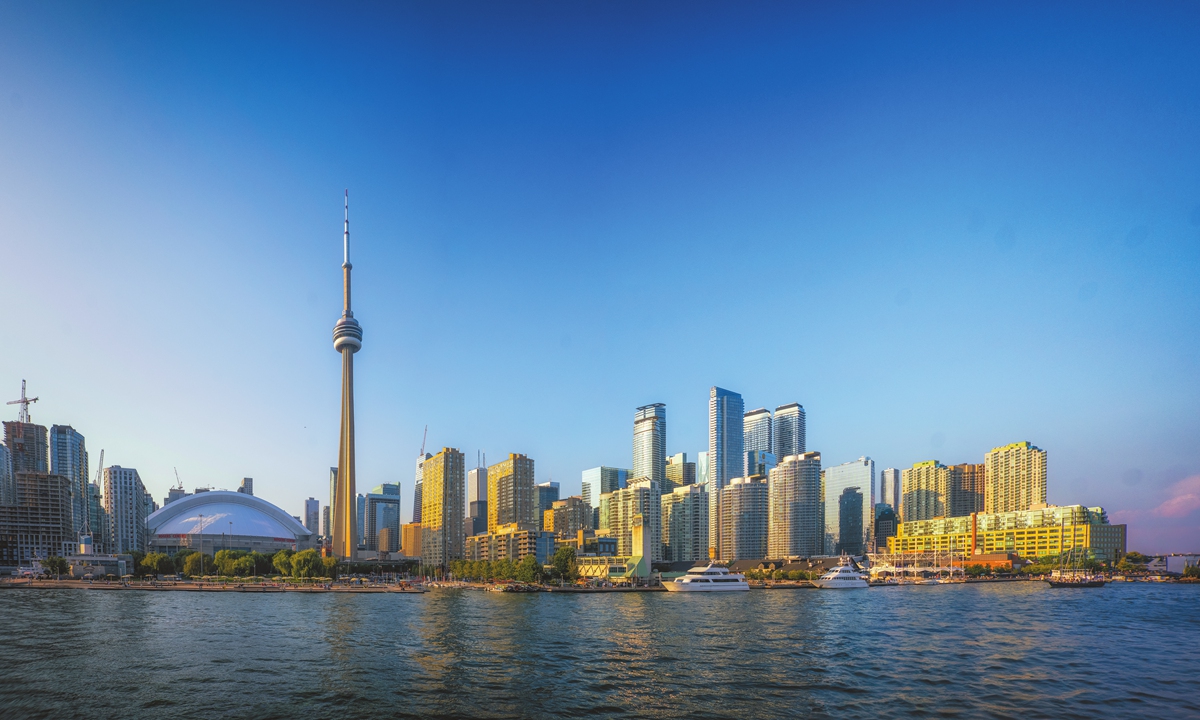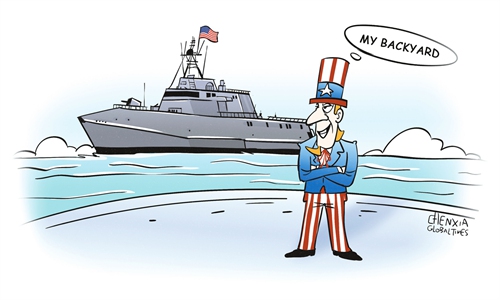Hopefully current controversy will make more Canadians realize the dangers of unconditional support for Washington: Canadian scholar

A view of Toronto, capital city of the Canadian Province Ontario. Photo: VCG
Editor's Note:
On Monday, Canadian Prime Minister Justin Trudeau announced his resignation as the leader of the country and the ruling Liberal Party, sparking widespread attention and discussion. This decision came amid a mounting set of crises facing Trudeau, including US President-elect Donald Trump's recent tariff threats and disastrous opinion polls. In a recent interview with Global Times (GT) reporter Xia Wenxin, Dr. Julián Castro-Rea (JCR), a political science professor at the University of Alberta in Canada, shares his insights on various pressing issues, including the impact of domestic leadership changes, the economic and political repercussions of US tariff threats and the irrationalities behind Canada's own tariff policies against China.
GT: If the tariff threats against Canada come true, how would it impact Canada's economy and Canada-US economic relations?
JCR: The imposition of excessive tariffs would gravely hurt Canada's economy and Canada-US economic relations. If imposed, those tariffs would be paid not by Canada, but by US importers, who would then transfer the cost to US consumers. This would contribute to inflation, the reduction of which was one of Trump's central campaign promises. More generally, the imposition of tariffs would damage the thick manufacturing supply lines now existing between the two countries.
GT: How do you view Trudeau's resignation? What do you believe are the main reasons behind it? Some in the media claim that the incoming US administration's "taunts and tariff threats" have added to the domestic woes Trudeau was facing. Do you agree with this?
JCR: Trudeau's resignation doesn't come as a surprise. It was anticipated months ago. He has been at the helm of the Canadian government for over nine years, so it is understandable that his charisma and initial momentum would wear off. Additionally, over time he has disappointed many of his voters with unfulfilled promises, such as electoral reform, government integrity, comprehensive pharmaceutical coverage, and substantial action on climate change. Regarding the latter, he implemented the very unpopular carbon tax, which has increased the tax burden on Canadians without demonstrating how it helps Canada meet its international commitments in combating climate change.
Yes, US president-elect's "taunts" and Trudeau's clumsy reaction to them certainly contributed to further discrediting Trudeau. Chrystia Freeland, former Canadian deputy prime minister and minister of finance, also played a role with her noisy resignation, which undermined Trudeau's support within the Liberal party.
GT: Former US secretary of state Henry Kissinger once said, "It may be dangerous to be America's enemy, but to be America's friend is fatal." Do you agree?
JCR: Kissinger also said, "America has no permanent friends or enemies, only interests." I think this statement is more accurate. The US has consistently used international alliances to protect and promote its interests, dropping those alliances as soon as its interests are challenged. These alliances may include democracies or dictatorships; the type of regime and its respect for the rule of law makes no difference to Washington as long as the allies align with US economic or strategic interests. It doesn't matter much whether Republicans or Democrats are in power; there is generally consensus and continuity in international alliances as long as they defend US interests.
GT: Speaking of tariffs, Canada, under the Trudeau administration, has chosen to impose a 100 percent tariff on imports of Chinese electric vehicles (EVs). It has also imposed a 25 percent additional tariff on Chinese steel and aluminum products. Recently, it was announced that Ottawa plans to impose tariffs on certain solar products and critical minerals from China starting as soon as this year. What do you think of such moves from Ottawa regarding trade with Beijing? Are they influenced by US policy?
JCR: Of course, those moves are influenced by US policy. The same can be said about the arrest of Huawei's Chief Financial Officer Meng Wanzhou, following orders from Washington.
I believe these threats are in blatant contradiction with the spirit of global free trade, which Canada is supposed to endorse. Following US policies can only harm Canada's international trade in the medium and long term. In the short term, Canadian consumers are deprived of the affordable options that Chinese EVs offer, which also hinders the climate change goals adopted by Ottawa.
GT: Why has the use of tariffs become so frequent for countries like the US and Canada? What is their objective, and will these threats be realized?
JCR: The objective of raising tariffs is, of course, to protect domestic industries, and to sanction countries that are either more competitive or not politically aligned. Beyond the bravado, it is still possible that these threats will be realized, either fully or partially, regardless of the consequences for the global economy and stability.
GT: In the future, is it still possible for Canada to adopt a more independent and balanced political and economic strategy to safeguard its national interests in the intensified great power game?
JCR: Canada used to be a fairly independent middle power, known for its commitment to humanitarian principles, mediation abilities and leadership in some global regions. The golden years of Canadian international presence spanned from the end of World War II until the late 20th Century. During that period, the Canadian governments were usually cautious in their relations with the US, carefully negotiating to protect the country's interests and defend its independence. The governments led by prime ministers Lester Pearson and Pierre Trudeau stand out in this respect.
Unfortunately, this approach gradually changed, starting with the adoption of the Canada-US Free Trade Agreement in 1989. Subsequent governments decided to increasingly toe Washington's line. The events of 9/11 gave more momentum to this trend, when Canada joined the US-led invasion of Afghanistan. The trend has neither been halted nor reversed under the current Prime Minister Justin Trudeau (ironically Pierre's son).
So, in principle, Canada could indeed adopt a more independent and balanced political and economic strategy to safeguard its national interests. The problem is that the country is trapped in very narrow political options, a prisoner of path dependence on unconditional support for the US.
Hopefully, the current controversy with the US president-elect will make more Canadians realize the dangers of such unconditional support and demand that their government change course.



